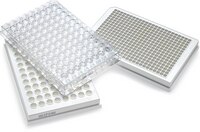Transportomics: screening for substrates of ABC transporters in body fluids using vesicular transport assays.
Krumpochova, Petra, et al.
FASEB J., (2011)
2010
Abstract anzeigen
The ATP-binding cassette (ABC) genes encode the largest family of transmembrane proteins. ABC transporters translocate a wide variety of substrates across membranes, but their physiological function is often incompletely understood. We describe a new method to study the substrate spectrum of ABC transporters: We incubate extracts of mouse urine with membrane vesicles prepared from Spodoptera frugiperda Sf9 insect cells overproducing an ABC transporter and determine the compounds transported into the vesicles by LC/MS-based metabolomics. We illustrate the power of this simple "transportomics" approach using ABCC2, a protein present at sites of uptake and elimination. We identified many new substrates of ABCC2 in urine. These included glucuronides of plant-derived xenobiotics, a class of compounds to which humans are exposed on a daily basis. Moreover, we show that the excretion of these compounds in vivo depends on ABCC2: compared to wild-type mice, the urinary excretion of several glucuronides was increased up to 20-fold in Abcc2(-/-) mice. Transportomics has broad applicability, as it is not restricted to urine and can be applied to other ATP-dependent transport proteins as well.-Krumpochova, P., Sapthu, S., Brouwers, J. F., de Haas, M., de Vos, R., Borst, P., van de Wetering, K. Transportomics: screening for substrates of ABC transporters in body fluids using vesicular transport assays. | 22034653
 |











